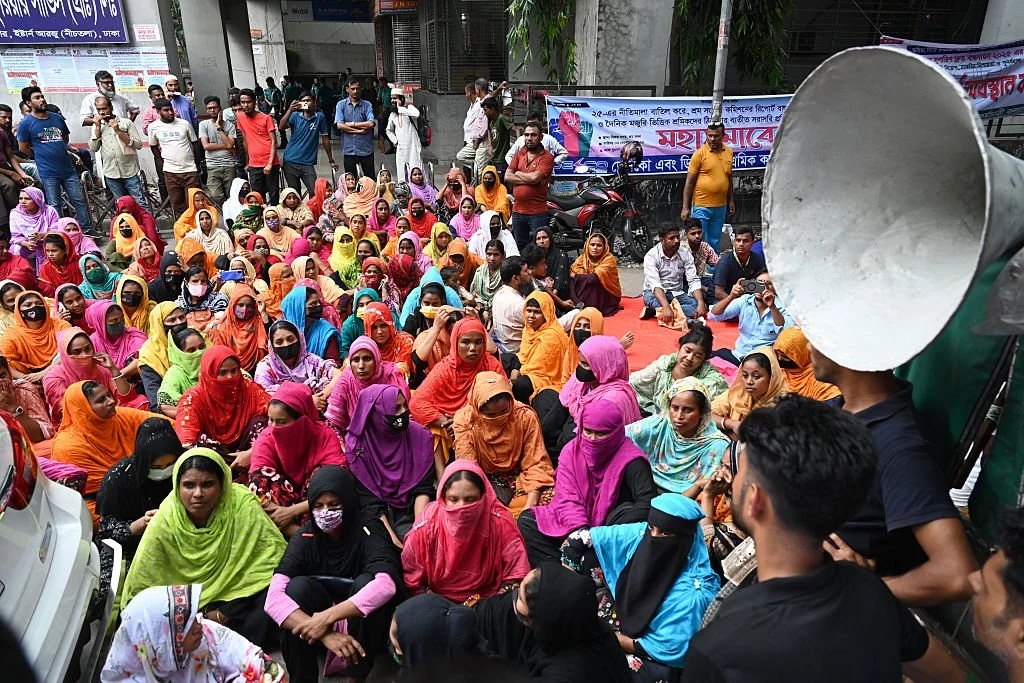What Does The Economy Have to Do With Gender Violence?
Garment workers in Dhaka, Bangladesh, protest to demand their unpaid wages, September 2025. Via Getty ImagesWhen we think about the causes of gender-based violence, a variety of things may come to mind—misogyny, power, entrenched cultural ideas—but money and economic policy usually don’t make the list.
But pan-African feminist political economist Fatimah Kelleher sees things differently. “There won’t be any gender justice until there is economic justice,” she says. For her, and a growing number of feminist economists around the world, what happens in homes or streets or workplaces and what happens in markets are intrinsically connected.
This year’s Free Future, held by the Ford Foundation in partnership with Pivotal Ventures, the UN Trust Fund to End Violence Against Women, and The Meteor, zeroed in on that exact theme: “Our Money, Our Lives.” After her session, Kelleher sat down with us to help us understand money’s relationship to violence—and to its solutions.
We know that most people don’t associate the economy with gender-based violence—but you say that even when they do, they have an image in their head that is actually only part of the picture. What do you mean?
When we think about economic violence, we think about financial abuse…which is coercion, and the way in which a woman's income can be controlled or withheld within an intimate partner scenario. And it’s great that that has come to the fore. When I opened a new bank account in the UK…they now have standard questioning around financial abuse, which is great.
But violence on a personal level is intrinsically linked to wider macro issues. For example, if food subsidies are cut, it's women who are more greatly impacted…because women are the keepers of the household budgetary purse, and we know that they experience poverty and hunger at far greater levels.
Similarly, if cuts have been made wholesale across public services [after] an economic downturn or a recession, it’s essentially domestic violence organizations that get cut, sometimes right down to the bone, to the point where they're closed, so that support service is just completely and utterly gone.
So you define gender-based violence not just as crimes like assault—but much more broadly.
Violence has five kinds of typologies—physical, verbal, psychological, sexual, and [socio-economic] deprivation. Deprivation is really where the entry point for gendered economic violence comes in. And if you have a system that is inherently unequal, there is an expectation of someone having to absorb the consequences of that inequality in one way or another.
And the motivation is quite an important question. So, for example, when we think of assault, we always see the motivation as being very deliberate, very conscious, right? The thing about gendered violence at the macroeconomic level is there's always this sort of pushback that, “Well, policymakers may not actually realize that [their policies are] impacting women disproportionately.” But if you go ahead and you deregulate an entire sector to the point that a factory collapses on women's heads, because you are either ignorant of the fact that more women are going to die on the back of these deregulations or are aware, but you've decided that it's an acceptable amount of collateral damage—regardless of intent, the consequence is the same. It's violence.
We’re talking about what we in the economic field call the “race to the bottom,” which involves a competition for the lowest wages possible—that always targets women. Why? Because women are in a far worse position to negotiate wages and contracts than others. Within a factory setting, there's already a whole variety of violence happening: sexual violence, and more generic physical violence because none of these women are on what we'd consider decent contracts…so they are really in the worst precarity you can imagine. Women's bodies are used as a sort of collateral damage within that process in order to drive growth. But there are real-world consequences, and women carry the physical realities of that abuse.
So in order to eliminate gender-based violence, we have to fix these huge systems of inequality. But how do you even start to think about solutions when the root causes are so large and imposing?
It's exhausting when you're trying to change an entire system. The thing I keep reminding myself of is that economic systems change all the time, and they’re far from stagnant, and they can be impacted, and they can essentially evolve. So it's not impossible, and I genuinely believe it will happen—although when it will happen is a different issue.
[Right now], when the economy starts to fail and policymakers sit around a table and figure out how to shore it up, women become “creditors of the nation.” What this means is that some women, usually the most vulnerable women, will absorb [the costs of shoring up the economy] and are often considered acceptable collateral damage.
In trying to come up with feminist economic alternatives, a question we need to keep in mind is: What is the economy even for? Is it just to have a society filled with stuff, with goods that we consume, or is it to create happy, contented, long, healthy lives?
The funding of public services—the healthcare system, the education system, public transportation, and water—is probably the most critical thing towards human well-being.
What does all of this mean for men? Even though there is a disproportionately gendered impact in the financial systems we live under, clearly, men and boys aren’t really benefiting either.
Absolutely. One of the misconceptions around feminist [economic] analysis is that we're only interested in uplifting women. That’s not correct.
I believe feminist analysis is going to create solutions that will help everybody effectively. I have a son, and there's no way I believe that my feminist analysis is going to be detrimental to him. The exact opposite: I believe it's going to help him to lead a healthier and more substantial and more worry-free life.
There won’t be any gender justice until there is economic justice. It does seem overwhelming because there is a lot of work to do—a ridiculous amount of work to do. But we can do it.

